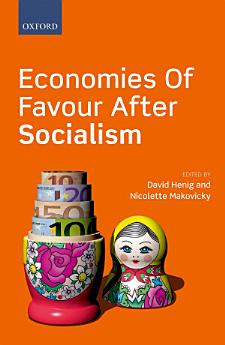Economies of Favour after Socialism
David Henig · Nicolette Makovicky
Dez 2016 · Oxford University Press
E-Book
280
Seiten
family_home
Zulässig
info
reportBewertungen und Rezensionen werden nicht geprüft Weitere Informationen
Über dieses E-Book
Since the onset of the global economic crisis, activists, policy makers, and social scientists have been searching for alternative paradigms through which to re-imagine contemporary modes of thinking and writing about economic orders. These attempts have led to their re-engagement with fundamental anthropological categories of economic analysis, such as barter, debt, and the gift. Focusing on favours, and the paradoxes of action, meaning, and significance they engender, this volume advocates for their addition to this list of economic universals. It presents a critical re-interrogation of the conceptual relationships between gratuitous and instrumental behaviour, and raises novel questions about the intersection of economic actions with the ethical and expressive aspects of human life. Scholars of post-socialist politics and society have often used 'favour' as a by-word for corruption and clientelism. The contributors to this volume treat favours, and the doing of favours, as a distinct mode of acting, rather than as a form of 'masked' economic exchange or simply an expression of goodwill. Casting their comparative net from post-socialist Central, Eastern, and South Eastern Europe; to the former Soviet Union, Mongolia, and post-Maoist China, the contributors to this volume show how gratuitous behaviour shapes a plethora of different actions, practices, and judgements across religious and political life, imaginative practices, and local moral economies. They show that favours do not operate 'outside' or 'beyond' the economic sphere. Rather, they constitute a distinct mode of action which has economic consequences, without being fully explicable in terms of transactional cost-benefit analyses.
Autoren-Profil
Nicolette Makovicky is Lecturer of Russian and East European Studies at the University of Oxford. She is the editor of Neoliberalism, Personhood, Postsocialism: Enterprising Selves in Changing Economies (Ashgate, 2014) and has published extensively on informal economic activity in Central Europe. David Henig is Lecturer in Social Anthropology at the School of Anthropology and Conservation, University of Kent. His research, conducted mainly in the Balkans and Central Asia, focuses largely on vernacular Islam, sacred landscape, exchange theory, and more recently on linking anthropology with global transnational history, diplomacy, international relations, and geopolitics. He has authored numerous publications on Islam, dervish orders, Muslim politics, and post-socialism.
Dieses E-Book bewerten
Deine Meinung ist gefragt!
Informationen zum Lesen
Smartphones und Tablets
Nachdem du die Google Play Bücher App für Android und iPad/iPhone installiert hast, wird diese automatisch mit deinem Konto synchronisiert, sodass du auch unterwegs online und offline lesen kannst.
Laptops und Computer
Im Webbrowser auf deinem Computer kannst du dir Hörbucher anhören, die du bei Google Play gekauft hast.
E-Reader und andere Geräte
Wenn du Bücher auf E-Ink-Geräten lesen möchtest, beispielsweise auf einem Kobo eReader, lade eine Datei herunter und übertrage sie auf dein Gerät. Eine ausführliche Anleitung zum Übertragen der Dateien auf unterstützte E-Reader findest du in der Hilfe.






